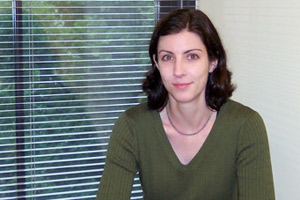Barth Receives NSF Grant for Cognition Research

Hilary Barth, assistant professor of psychology, was recently awarded a five-year, $761,000 grant from the National Science Foundation (NSF) to study “magnitude biases in mathematical cognition, learning, and development.” Barth will be conducting a series of studies with children and adults in the Cognitive Development Laboratory at Wesleyan to investigate abstract and perceptual magnitude biases.
The grant, which begins this year, comes from the NSF’s Faculty Early Career Development (CAREER) program. The program is only available to non-tenured faculty. Barth’s colleague Anna Shusterman was awarded a CAREER grant in 2009.
“The psychology department is thrilled about Professor Barth’s accomplishment,” says Lisa Dierker, chair and professor of psychology. “This achievement demonstrates NSF’s confidence in Professor Barth’s ability to be at the forefront of the next generation of leaders in research and education.”
Dierker added that the NSF’s CAREER Program represents an extremely prestigious award in support the nation’s most promising scholars.
The project will allow Barth, who is also an assistant professor of neuroscience and behavior, to investigate two types of magnitude biases: abstract magnitude biases, which cause people to misunderstand the sizes of numbers, and perceptual magnitude biases, which make it difficult to estimate the sizes of objects or shapes accurately.
“I’m excited to receive this grant because it will allow the Cognitive Development Lab’s research program to expand a bit—we’ll be able to work on some new studies that would have been difficult to conduct without this funding,” Barth says.
Barth says a benefit of the grant is that it will also allow her to further build connections between the Cognitive Development Lab and the mathematics education community.
The initial studies funded under this grant will challenge a popular theory explaining developmental change in children’s understanding of numbers; specifically: as children age and gain experience, they begin to rely on more mature, accurate, linear mental representations of number (instead of relying on immature, inaccurate, nonlinear mental representations of number). The new studies will explore an alternative theory: older children perform more accurately than younger children on many numerical tasks because they are better at making proportional judgments, not because they are thinking about numbers in a fundamentally different way.
Some of Barth’s first studies will use number line tasks, in which children will be presented with a number line marked with “0” at one end and “100 or “1000” at the other. The children will be asked to mark a number’s position on the line. Other studies will involve a wide range of simple guessing games about numbers and quantities. Accurate numerical representation is a key to success in math education, so it’s important to explore the underlying reasons for these developmental changes.
Wesleyan undergraduates will be an integral part of the research and will help with study design, implementation, and data collection and analysis, among other tasks. The grant funds a summer research fellowship program for undergraduates, a focused, intensive undergraduate-level research course, a service-learning course and yearly workshops for faculty members. Barth’s project will also include work with the Wesleyan McNair Scholars and the Project to Increase Mastery of Mathematics and Science (PIMMS) program.
“By integrating Wesleyan undergraduates into her research, Dr. Barth will also be making important contributions to the training of future scientists who will be uniquely able to translate this basic science into educational practice,” Dierker says.
Barth suggests that undergraduates who want to be involved in the project successfully complete a cognitive psychology class and/or a developmental psychology class.
“And, of course, they should be excited about mathematical cognition research,” she says.
Barth hopes her work will help increase understanding of just how magnitude biases may interfere with common types of research studies. Among other things, this should lead toward the creation of better interventions for students who struggle with learning certain math concepts.
Barth’s research on mathematical cognition is likely to reach math teachers, parents and students as improvements to instructional materials and math manipulatives are created based on what her team learns during this five-year period.
“Wesleyan and the community will benefit enormously from these new training opportunities and the creation of long term research-educational partnerships with Middletown schools,” Dierker says.

